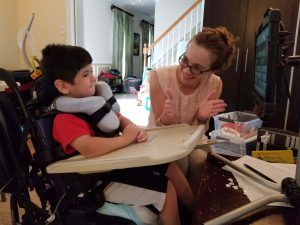 I plopped down beside Joey one afternoon, and asked him how his day had been. He quickly began chatting away, “More, stop, vehicle,” he said.
I plopped down beside Joey one afternoon, and asked him how his day had been. He quickly began chatting away, “More, stop, vehicle,” he said.
“Really?” I asked, “Tell me more.”
“Caterpillar. Eagle. Awesome. Whale.”
“Cool,” I replied. “So what book do you want to read?”
“Don’t, itchy, hole, hump, brush, antenna” he said.
“Let’s stay on topic” I replied cheerily, as I do sometimes when he doesn’t answer my direct question. “We can read the book about the bugs, or the book about the stick. You can tell me which one you want using those words.”
Joey looked at me with frustration and maybe a little disgust. He stared hard at one of the boxes on the floor that contained our book. Finally, he added “Paintbrush”.
Oh. Of course. We have been reading Not a Stick. He was trying to get as close as he could to telling me what he wanted to read. Don’t is on the same page as not, and the picture icons that represent the words are not obviously different. He eventually found brush when he couldn’t remember what paintbrush was. The other words were all ones he either hit accidentally, hit because he couldn’t remember what word the picture represented, or couldn’t remember exactly where the vocabulary for the book was on the device. These mis-hits create a string of random words, which can easily get lost in what looks like “playing around” behavior.
It can be hard to know if Joey is simply selecting words on the device, or if he is really trying to tell me something. Sometimes, he really is just choosing random words. And other times, he’s actively seeking for his vocabulary and trying to make his ideas known, as much as he can.
Sometimes, I never do figure out what he’s talking about. And maybe at those times he really is just saying random words. But more often than not, someone will later tell me, “Oh, we saw a caterpillar on our walk today,” or, “There was a picture of a whale on the TV behind you”, and I realize that what I assumed was random was actually attempts at communication.
Sometimes, presuming competence can feel awkward. Yet, if we don’t, we discourage a person’s communication attempts. If no one listens to you, will you keep trying to talk? Will you believe that you have something important to say?
As I pulled the book, Not a Stick out of its box, Joey grinned. “Awesome” he said. I thanked Joey for sticking with me enough to get his message across. “Sometimes I might not understand you the first time. Thanks for helping me get there.” “Read” he replied.
OK, enough small talk. We’ll read.


